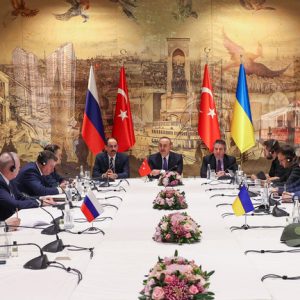
Peace-talks outcome: Russia to ‘drastically’ cut military activity near Kiev for sake of successful peace negotiations
Keep up to Date & Bypass the Big Tech Censorship
Get uncensored news and updates, subscribe to our daily FREE newsletter!
Russia has “drastically” reduced its military activity near Kiev and Chernigov as talks with Ukraine enter the “practical” stage, the deputy minister of defense Alexander Fomin announced on Tuesday.
Speaking to the press following the talks with the Ukrainian delegation, Fomin said that “a decision was made to drastically, in several times, reduce the military activity on the approaches to Kiev and Chernigov.”
“We expect that relevant key decisions will be taken in Kiev and the conditions for further normal work will be created,” he said.
| Recommended Books [ see all ] | ||||
|---|---|---|---|---|
 |  |  |  |
 |
Fomin called on Ukraine “to fully abide by the Geneva Conventions, including with regard to the humane treatment of prisoners of war.”
Vladimir Medinsky, the head of the Russian delegation at the talks with Ukraine also said on March 29:
- Ukraine refuses from its aspiration to return Crimea and Donbass militarily.
- Russia does not stand against Ukraine’s accession to the European Union.
- Ukraine’s proposals on security guarantees will not apply to Crimea and Donbass
He explained that this decision was taken due to the fact that “negotiations on the preparation of an agreement on the neutrality and non-nuclear status of Ukraine, as well as on the provision of security guarantees to Ukraine” are entering “the practical phase.”
Reduction of Russian forces’ activity is poised “to increase mutual trust and to create the necessary conditions for the further development of negotiations and the achievement of the ultimate goal of agreeing and signing the agreement,” Fomin said.
Further details will be announced by the Russian General Staff upon the return of the Russian delegation from Istanbul, where the negotiations were taking place, to Moscow.
Moscow attacked its neighbor in late February, following a seven-year standoff over Ukraine’s failure to implement the terms of the Minsk agreements, and Russia’s eventual recognition of the Donbass republics in Donetsk and Lugansk. The German- and French-brokered protocols had been designed to regularize the status of those regions within the Ukrainian state.
Russia has now demanded that Ukraine officially declare itself a neutral country that will never join the US-led NATO military bloc. Kiev insists the Russian offensive was completely unprovoked and has denied claims it was planning to retake the two republics by force.
Moscow’s envoy described conditions for Putin’s talks with Zelensky
Russia has agreed to meet Kiev half-way and will allow a meeting of its leaders to be held on the same day that the final version of a peace treaty is pre-approved by the two nation’s foreign ministers, Moscow’s top negotiator said on Tuesday, after a new round of talks in Istanbul.
Previously, Moscow had insisted that a meeting between Russian President Vladimir Putin and his Ukrainian counterpart Volodymyr Zelensky could only be set after the deal would be finalized.
Vladimir Medinsky described the talks in Turkey as “constructive” and said his delegation had received a clearly outlined position on what Kiev sought to achieve. The written proposal, which includes Ukraine’s pledge to remain a neutral nation and that it will not try to obtain any weapons of mass destruction, including nuclear weapons, will be relayed to Putin, he said.
Coinciding with Medinsky’s statement to the press, the Russian defense ministry announced it was drastically reducing its military operations in some parts of Ukraine, including near the capital, Kiev. The ministry cited “the talks moving into the practical dimension,” as the reason for the change.
David Arakhamia, Medinsky’s opposite number in the Ukrainian delegation, said Kiev had sought a security guarantee from a number of nations that would work not unlike NATO’s mutual self-defense commitment.
He named the UK, China, the US, Turkey, France, Canada, Italy, Poland and Israel as possible guarantors, and claimed some of them have given their preliminary agreement to serve in that capacity.
The proposed security pledge will not apply to the parts of Ukraine whose status remains in dispute, Arakhamia said. These include Crimea, which Russia considers its territory, and the breakaway Donetsk and Lugansk People’s Republics, which Russia recognized as sovereign states and whose forces are taking part in ongoing hostilities.
Turkish Foreign Minister Mevlut Cavusoglu remarked that he hoped that the outcome of the negotiation would soon lead to a ceasefire and a sustainable political resolution of the crisis.
Last month, Russia launched a military attack on Ukraine over Kiev’s failure to implement the terms of the Minsk ceasefire agreements, and Russia’s eventual recognition of the Donbass republics in Donetsk and Lugansk. The German- and French-brokered protocols had been designed to regularize the status of those regions within the Ukrainian state.
Kiev says the Russian offensive was completely unprovoked and has denied claims it was planning to retake the two republics by force.
Source: https://www.rt.com




